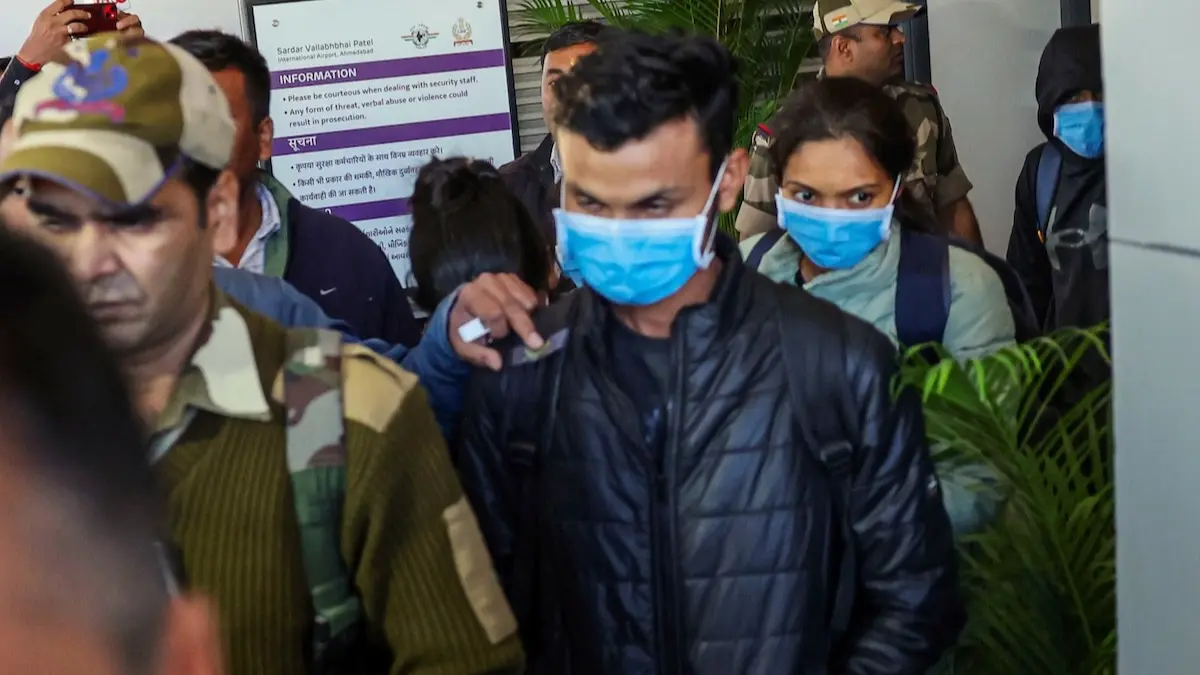Updated 16 March 2025 at 17:09 IST
What Is the New Indian Immigration Bill That Proposes 7-Year Jail for Using Forged Passport?
The Immigration and Foreigners Bill, 2025 is a comprehensive legislation to regulate all matters relating to foreigners and immigration.
- India News
- 4 min read

New Delhi: The Union Home Ministry has introduced the Immigration and Foreigners Bill, 2025, aiming to overhaul India's immigration laws with stricter penalties for illegal entry, fake documents, and overstaying foreigners. If passed in Parliament, individuals using forged passports or visas to enter, stay, or exit India could face up to seven years in jail and fines reaching ₹10 lakh.
Stricter Rules for Foreigners in India
The proposed law introduces stricter regulations to monitor and track foreigners in the country. Hotels, universities, educational institutions, hospitals, and nursing homes will be legally bound to report foreign nationals staying on their premises. This step is aimed at curbing illegal overstays and ensuring a tighter grip on the movement of foreigners.
Additionally, international airlines and ships must provide a passenger and crew manifest at Indian ports before arrival. Advance submission of travel details will help authorities track individuals entering the country.
Advertisement
Heavy Penalties for Fake Documents
Under the bill, anyone knowingly using or providing forged travel documents or fake visas will face a minimum of two years imprisonment, which can extend up to seven years. A fine of at least ₹1 lakh, extendable up to ₹10 lakh, will also be imposed.
For foreigners entering India without valid documents, the penalty will be up to five years in jail and a fine of up to ₹5 lakh.
Advertisement
Government’s Plan to Monitor ‘Frequented Places’
The bill gives the Centre the power to regulate places that are frequented by foreigners. Owners may be asked to shut down premises, impose specific conditions, or deny access to certain categories of foreigners. This provision is aimed at national security and preventing unlawful activities.
Replacing Old Laws with a Comprehensive Framework
Currently, India’s immigration laws are governed by four separate acts:
- The Passport (Entry into India) Act, 1920
- The Registration of Foreigners Act, 1939
- The Foreigners Act, 1946
- The Immigration (Carriers' Liability) Act, 2000
The new Immigration and Foreigners Bill, 2025, seeks to simplify and replace all four acts with a single, updated framework suited to modern challenges.
Focus on Security and Economic Growth
The Home Ministry believes the new bill will help balance national security with economic and tourism needs. While cracking down on illegal immigration, the government also aims to ease the compliance burden for legal travelers and businesses.
"The bill will help in tracking overstaying foreigners and tackling illegal migration while also making processes more transparent," a government official said.
Currently, India grants visas in both physical and electronic formats. The Bureau of Immigration (BoI) handles e-visas for 167 countries under seven categories. Additionally, visa-on-arrival is available for travelers from Japan, South Korea, and the UAE (under specific conditions).
Foreigners holding long-term visas exceeding 180 days (such as student, employment, or medical visas) must register with Foreigners Regional Registration Offices (FRRO) within 14 days of arrival. Pakistani nationals must register within 24 hours.
Even with a valid visa, certain areas in India require special permits for foreign visitors. These include:
- Several northeastern states
- The Andaman and Nicobar Islands
- Parts of Jammu & Kashmir, Uttarakhand, Himachal Pradesh , and Rajasthan
Rising Foreign Visitors to India
According to Home Ministry data, between April 1, 2023, and March 31, 2024, 98.40 lakh foreigners visited India. The government believes stricter immigration laws will help track visitors effectively while boosting legitimate tourism and economic activities.
The proposed law, however, does not deal with citizenship issues and remains separate from the Citizenship Act, 1955, which governs nationality and Overseas Citizen of India (OCI) status.
With this legislation, the government aims to create a robust immigration system that strengthens security while facilitating legal travel and business operations in India.
The stay and movement of foreigners in India and their exit are regulated by the BoI and state governments and Union Territory administrations.
According to existing laws, all foreigners on long-term (more than 180 days) student, medical, research, employment, missionary and project visas are required to register with the Foreigners Regional Registration Officer (FRRO) or the Foreigners Registration Officer (FRO) concerned, having jurisdiction over the place where the foreigner intends to stay, within 14 days of arrival.
Pakistani nationals are required to register within 24 hours of their arrival.
Other laws that cover foreigners in India include the Citizenship Act, 1955, which regulates acquisition and termination of Indian citizenship as well as acquisition and registration of foreigners as Overseas Citizens of India (OCI).
Apart from movement, stay and visa, there are certain protected areas in India where foreigners need special permits to travel, including multiple states in the northeastern region, the whole of Andaman and Nicobar, and parts of Jammu and Kashmir, Uttarakhand, Himachal Pradesh and Rajasthan.
According to Union Home Ministry data, 98.40 lakh foreigners visited India between April 1, 2023, and March 31, 2024.
Get Current Updates on India News, Entertainment News, Cricket News along with Latest News and Web Stories from India and around the world.
Published By : Aditi Pandey
Published On: 16 March 2025 at 13:55 IST
